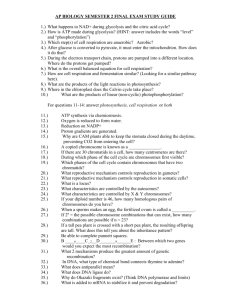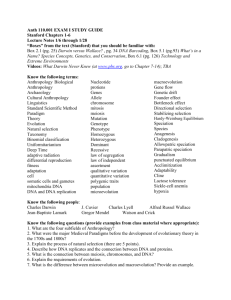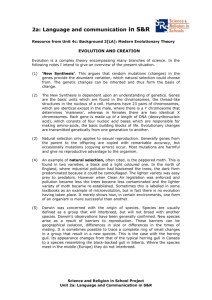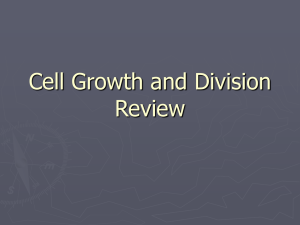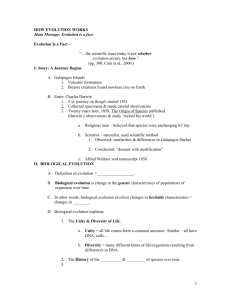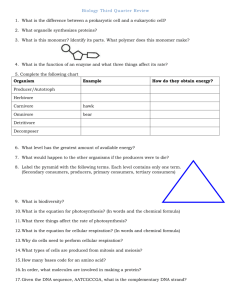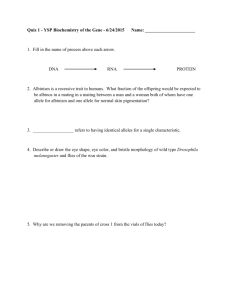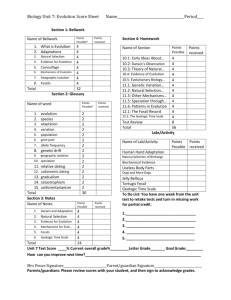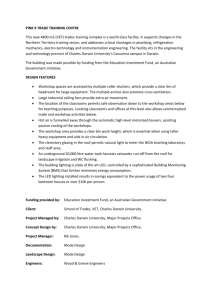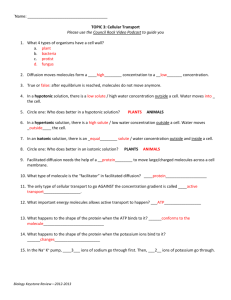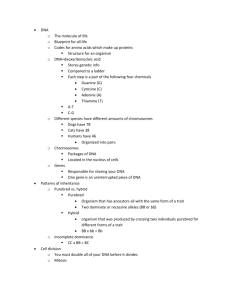Student notes – Evolution
advertisement
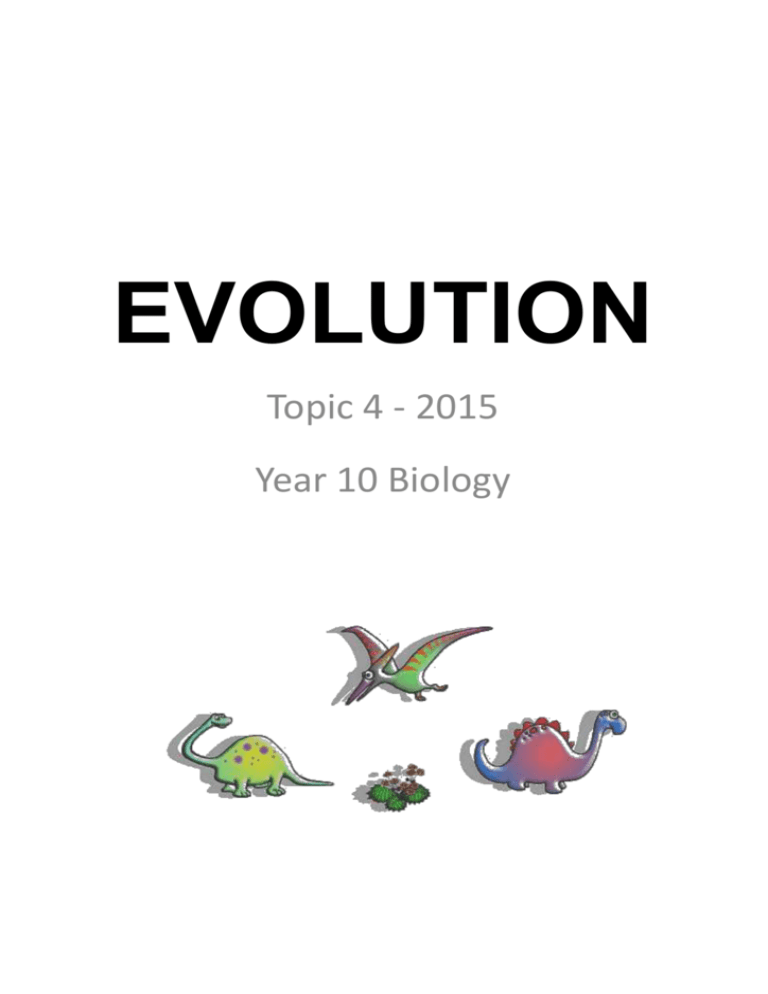
EVOLUTION Topic 4 - 2015 Year 10 Biology TOPIC 4 – EVOLUTION Things to cover: 1. History of Evolution 2. Natural selection 3. The Environment & Evolution 4. Artificial selection Work to do: 1. Worksheet – Natural selection, Evolution & Speciation 2. Worksheet – Isolating mechanisms & Evolution 3. Worksheet – Evolution & continental drift Suggested questions: 1. Textbook Qs – Ex3.2– p121 – Q1, 4-5, 8, 11 2. Textbook Qs – Ex3.3 – p127 – Q1, 4-5, 11 3. Textbook Qs – Ex3.4– p130 – Q1-4, 9 Ideas to know: Jean B. Lamarck Charles Darwin Alfred Wallace Alfred Wegener Natural selection Survival of the fittest Selection pressure Speciation Variation Adaptation Extinction Artificial selection REVIEW Topic 1 • DNA is composed of ____________________ . • Each nucleotide consists of: − A ____________________ sugar − A ____________________ group − A ____________________ base (_____ types) • The nucleotides form chains. Two chains twist to form the ____________________ shape of the DNA molecule. • Chemical bonds hold the DNA molecule together. Strong ____________________ bonds hold the nucleotides together, while weak ____________________ bonds form between the bases. Topic 2 • DNA is coiled up tightly to form _______________ • There are _______________ of chromosomes in every cell. • Most of these are _______________ , controlling general characteristics. • One pair are the _______________ , controlling both sexual and general characteristics. • Cell division is necessary for ____________________, ____________________ and reproduction. • One type of cell division, ____________________, is used in the formation of new body cells. It is also used by unicellular organisms for ____________________ reproduction. The __________ daughter cells formed are ____________________ to the parent cell and have __________ chromosomes. • The other type of cell division, ____________________, is used to form sex cells. Another name for the products of this type of division are ____________________ This process takes place in the reproductive organs. The __________ daughter cells formed are ____________________ to the parent cell and have __________ chromosomes. They are also ____________________ in size. • In order for cell division to occur, the DNA must ____________________ and the chromosomes must divide equally between the cells. • ____________________ can occur if this does not happen correctly. For example, disorders involving additional or missing ____________________. • Down Syndrome is one example. This disorder results from the presence of ____________________ Chromosome 21. This is called ____________________ 21. VARIATION HISTORY OF EVOLUTION • The Book of ____________________ states that the world was created by a divine being in six days. • Still a widely held Theory of Evolution known as “___________________________________”. • The Greek philosopher ____________________ perceived a “ladder of life” where simple organisms ____________________ ____________________ to more ____________________ forms. 1785: • James ____________________ believed that the earth was formed by an ancient progression of ____________________ ____________________, including erosion, disruption, and uplift. 1798: • Thomas Malthus − proposed idea that populations ____________________ ____________________ ____________________ than they can ____________________ • Georges Cuvier − suggested that the earth was ____________________ years old − is well known for establishing ____________________ as a fact 1809: • Jean B. ____________________ proposed the Theory of ____________________ ____________________ • This states that ____________________ ____________________ in an organism’s life time are ____________________ to ____________________. • For example, the neck of the giraffe stretched as it reached for food and its offspring would retain this longer neck. 1830: • Charles Lyell published evidence suggesting the age of the earth was ____________________ __________________ years. HISTORY OF EVOLUTION 1844: • ________________________________________ • Established that all species of life have descended over time from ________________________________________. • He proposed that this ____________________ pattern of evolution resulted from a process that he called ____________________ ____________________. 1859: • ____________________ ____________________ • Developed a concept of evolution similar to Darwin's. • Independently proposed a theory of evolution due to natural selection that prompted Charles Darwin to publish his own theory. 1915: • Alfred ____________________ • Proposed a theory of ____________________ ____________________, which hypothesized that the continents were slowly drifting around the Earth. WHAT IS evolution? • Evolution involves ____________________ which are ____________________ (ie. Involves DNA & genetics!). • Evolutionary change is usually ___________________ and may take ____________________ to show up, especially for organisms of long generation time (eg. ____________________). • For evolution to happen, 2 things need to occur: 1. − resulting from ____________________, ____________________ and ____________________ 2. − caused by ____________________ ____________________ WHAT IS natural selection? • Charles Darwin’s theory • He suggested that, within a species, the individuals with ____________________ that ____________________ their environment ____________________ to ____________________ and ____________________ their variation to their ____________________. • Another way of saying this is that they are ____________________ survival by their ____________________. • Individuals with unadapted variations are said to be ____________________ ____________________. • These either fail to ____________________, or, if they do survive, do not ____________________ as successfully. • Overtime, they will become ____________________. WHAT IS natural selection? • In the following generations: − there will be an ____________________ in the proportion of ____________________ individuals − and a ____________________ in proportion of ____________________ individuals • The result is the ____________________ of the ____________________. • Over many ____________________, populations become more and more different from each other so that eventually, ____________________ ____________________ ____________________. • The new species will no longer be able to mate successfully with the old species. Quick guide to Natural Selection: 1. ____________________ of ____________________ occurs 2. ____________________ exists in a population 3. ____________________ ____________________ 4. ____________________ ____________________ one variant and ____________________ another 5. ____________________ ____________________ variant survives to ____________________ 6. ____________________ becomes ____________________ ____________________ in population The ENVIRONMENT & EVOLUTION • A major driving force behind evolution is the ____________________ in which the species lives. • ____________________ ____________________ in the environment influence the survival chances of an individual in that environment • Selection pressures may be: − Biotic = ____________________ • eg. ____________________, ____________________, ____________________, ____________________, ____________________ − Abiotic = ____________________ • eg. ____________________, ____________________, ____________________, ____________________, ____________________ • The result of this selection is ____________________. • If a species is somehow ____________________ into two groups by an ____________________ ____________________ or barrier, one species could potentially ____________________ into two. • If the ____________________ on either side of the barrier are ____________________, each environment will ____________________ a different ________ of ____________________. • The two isolated groups ____________________ ____________________, so there is no ____________________ ____________________ between them. • After a long period, the groups on either side of the barrier may become so different that they can no longer interbreed even when put together. • One species has ____________________ into two = speciation • Two examples of evolution in response to environmental change include: 1. Biston betularia the peppered moth 2. ____________________ ____________________ ____________________ in ____________________ The ENVIRONMENT & EVOLUTION Example: The peppered moth • One of the earliest and best documented cases of natural selection. • Up until mid 19th century, most peppered moths were _________________ in colour. • This allowed them to be __________________________________ on the light coloured _________________ on the trees and rocks. • A black _________________ form did exist, but numbers were _________________ because they were easily seen by _________________. • As _________________________ spread, soot and _________________ increased the number of lichens being killed off and also resulted in the tree trunks being much _________________. • The numbers of the ______________________________ increased and the numbers of the light form decreased because the light form now became more visible to predators. Artificial selection • Dogs are a great example of evolution in action. • All dogs are members of the exact ____________________ ____________________: Canis lupus familiaris • All dogs, whether Chihuahua or Great Dane, are ____________________ of ____________________ and ____________________ ____________________ ____________________ — but there may be some ____________________ complications involved here. • ____________________ selection works like ____________________ selection, in that only individuals with certain traits get to have offspring. • The main difference is that in artificial selection, ____________________ are selecting certain traits, and with natural selection, individuals with traits allowing survival and reproductive success do the best. • Artificial selection in dogs has occurred over thousands of years, a relatively small time interval in the grand scheme of evolutionary time.
